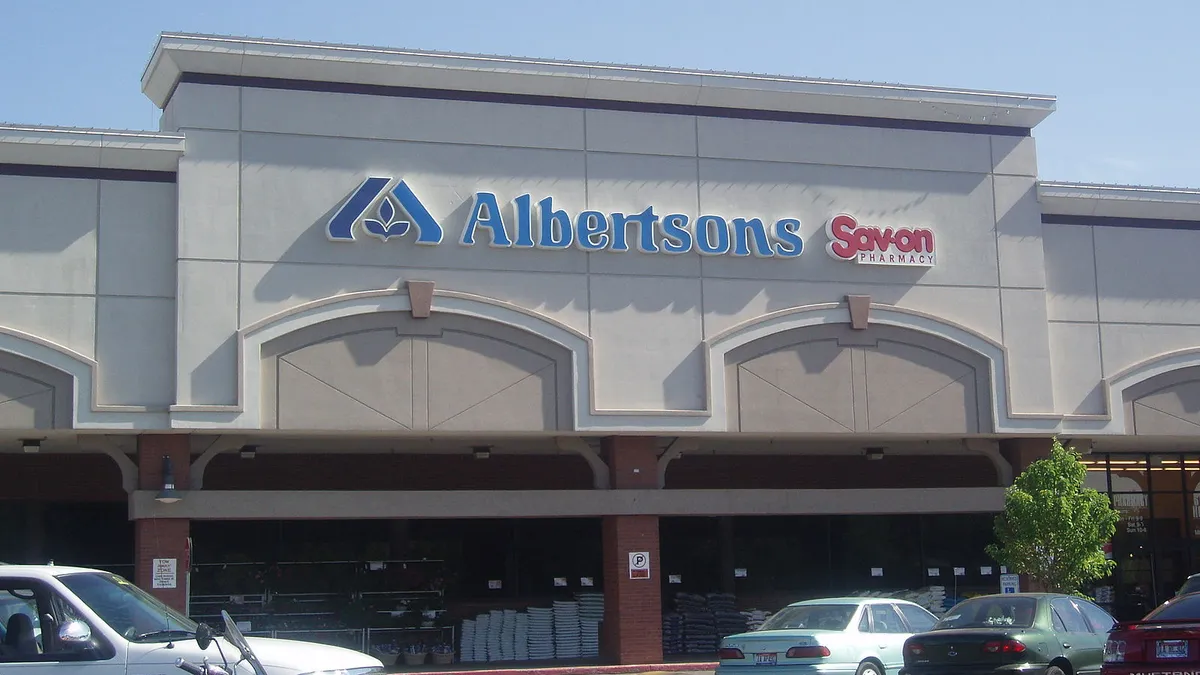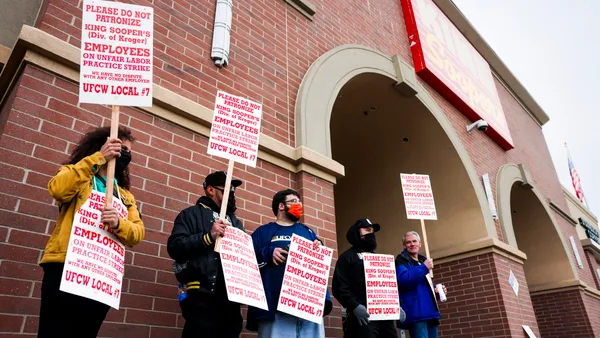Dive Brief:
- Albertsons announced a 1.8% increase in net sales to $13.8 billion for its third financial quarter of 2018, which ended December 1, according to a company press release. The increase was driven by a 1.9% increase in identical sales as well as higher fuel sales of $91.7 million, though that was partially offset by lower sales due to store closures during the first three quarters of fiscal year 2018.
- The company also reported e-commerce sales growth of 73% while sales penetration of its Own Brands, including O Organics, reached 25.2%. Net income for the third quarter was $45.6 million and gross profit margins increased to 27.8%.
- Albertsons president and CEO Jim Donald said the company continues to gain traction in delivering a seamless omnichannel shopping experience and that the third quarter saw the company’s strongest identical sales increase since Q1 2016. “Identical sales grew for the fourth consecutive quarter, and Adjusted EBITDA grew over 50% compared to the same quarter last year, as the business has rebounded from fiscal 2017,” Donald said.
Dive Insight:
Albertsons' leadership seems to be satisfied by these earnings as the company expands its e-commerce and private label offerings while also offloading debt and updating stores. The grocery company made a number of digital moves in 2018 that have served it well, including a new online marketplace and a partnership program to pilot robots for online order fulfillment. The grocer is well aware of its need to evolve to deliver for customers both offline and online, and shoppers are responding well as e-commerce growth surged for the second straight quarter.
The success of Albertsons Own Brands is also notable for Q3, and strong performance in this area will remain essential to Albertsons’ continued financial success as private label brands grow in popularity. Albertsons has also invested in a number of store remodels across the country, transforming its traditional look and feel to a more enticing format focused on fresh offerings.
“The results are encouraging as the grocery business remains extremely competitive," Moody’s vice president Mickey Chadha said of Albertsons earnings in an email to Grocery Dive. "Profitability also improved significantly compared to the same quarter of the previous year as lower shrink and increased private label penetration, increased gross margin and cost reduction lowered the operating expense line."
Albertsons made significant moves toward reducing its debt during the third quarter, selling five distribution centers in leaseback deals and freeing up $660 million in capital. In the company’s earnings release, Donald noted that Albertsons has reduced its principal debt balance by approximately $1 billion. But while that is positive movement, the company still has a long way to go.
“Although the debt reduction of over $1.5 billion in 2018 is a step in the right direction, the company’s proforma lease and pension adjusted leverage remains high at about 6.3x, therefore we expect to see continued debt reduction going forward,” Chadha said.
Several other factors impacted Albertsons’ third quarter results. On the positive side, fuel sales were again significant for the retailer, reflecting the increasing role of fuel rewards in the grocery industry.
There were also negative influences, with Albertsons’ bottom line taking a hit from the industry-wide recall on romaine lettuce. Research from Nielsen has shown that past recalls not only affect sales of romaine, but of lettuce overall – a major blow to retailers that sell fresh produce. Natural disasters also had a significant impact on Albertsons sales for stores operating in affected areas, including two major wildfires fires in California and a recent magnitude 7.0 earthquake in Alaska. While in some cases natural disasters can spur increased sales, store closures during other catastrophic events can cause major financial losses for grocery stores.
Despite a failed merger with Rite Aid last year and a notable amount of debt being carried into 2019, Albertsons is moving forward with its eyes on growth. The grocery industry is more competitive than ever with changes sweeping across traditional grocery companies, the increased prevalence of small format and specialty stores and the omnipresent rise of online grocery. But Albertsons has a game plan to grow e-commerce sales and put in-store experience at the center of its strategy, and this should keep the company relevant in the coming year.













